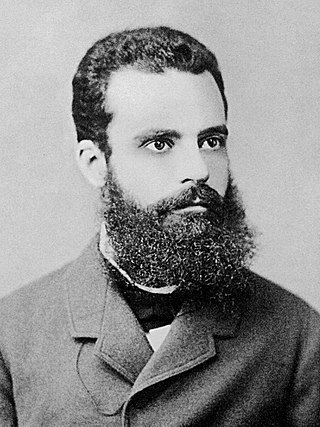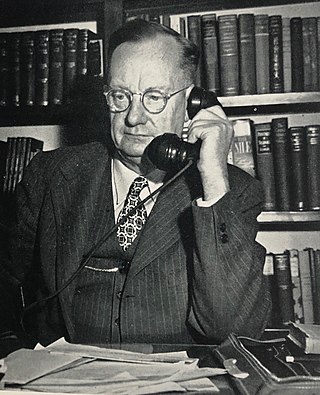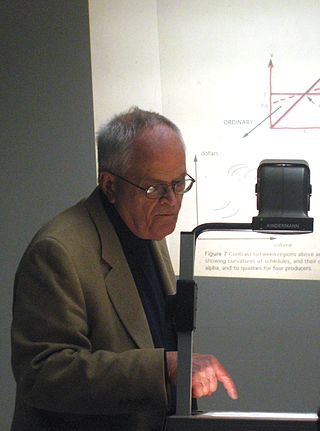
Vilfredo Federico Damaso Pareto was an Italian polymath. He made several important contributions to economics, particularly in the study of income distribution and in the analysis of individuals' choices. He was also responsible for popularising the use of the term "elite" in social analysis.

Manuel Castells Oliván is a Spanish sociologist. He is well known for his authorship of a trilogy of works, entitled The Information Age: Economy, Society and Culture. He is a scholar of the information society, communication and globalization.

The following outline is provided as an overview of and topical guide to academic disciplines:

Robert Ezra Park was an American urban sociologist who is considered to be one of the most influential figures in early U.S. sociology. Park was a pioneer in the field of sociology, changing it from a passive philosophical discipline to an active discipline rooted in the study of human behavior. He made significant contributions to the study of urban communities, race relations and the development of empirically grounded research methods, most notably participant observation in the field of criminology. From 1905 to 1914, Park worked with Booker T. Washington at the Tuskegee Institute. After Tuskegee, he taught at the University of Chicago from 1914 to 1933, where he played a leading role in the development of the Chicago School of sociology.

James Samuel Coleman was an American sociologist, theorist, and empirical researcher, based chiefly at the University of Chicago.

In sociology, social complexity is a conceptual framework used in the analysis of society. In the sciences, contemporary definitions of complexity are found in systems theory, wherein the phenomenon being studied has many parts and many possible arrangements of the parts; simultaneously, what is complex and what is simple are relative and change in time.

Barry Wellman is an American-Canadian sociologist and is the co-director of the Toronto-based international NetLab Network. His areas of research are community sociology, the Internet, human-computer interaction and social structure, as manifested in social networks in communities and organizations. His overarching interest is in the paradigm shift from group-centered relations to networked individualism. He has written or co-authored more than 300 articles, chapters, reports and books. Wellman was a professor at the Department of Sociology, University of Toronto for 46 years, from 1967 to 2013, including a five-year stint as S.D. Clark Professor.

Sociology as a scholarly discipline emerged, primarily out of Enlightenment thought, as a positivist science of society shortly after the French Revolution. Its genesis owed to various key movements in the philosophy of science and the philosophy of knowledge, arising in reaction to such issues as modernity, capitalism, urbanization, rationalization, secularization, colonization and imperialism.

Emory Stephen Bogardus was a prominent figure in the history of American sociology. Bogardus founded one of the first sociology departments at an American university, at the University of Southern California in 1915.
Richard Swedberg is a Swedish sociologist. He is currently Professor Emeritus at the Department of Sociology at Cornell University.
Randall Collins is an American sociologist who has been influential in both his teaching and writing. He has taught in many notable universities around the world and his academic works have been translated into various languages. Collins is currently the Dorothy Swaine Thomas Professor of Sociology, Emeritus at the University of Pennsylvania. He is a leading contemporary social theorist whose areas of expertise include the macro-historical sociology of political and economic change; micro-sociology, including face-to-face interaction; and the sociology of intellectuals and social conflict. Collins's publications include The Sociology of Philosophies: A Global Theory of Intellectual Change (1998), which analyzes the network of philosophers and mathematicians for over two thousand years in both Asian and Western societies. His current research involves macro patterns of violence including contemporary war, as well as solutions to police violence. He is considered to be one of the leading non-Marxist conflict theorists in the United States, and served as the president of the American Sociological Association from 2010 to 2011.

Harrison Colyar White is the emeritus Giddings Professor of Sociology at Columbia University. White played an influential role in the “Harvard Revolution” in social networks and the New York School of relational sociology. He is credited with the development of a number of mathematical models of social structure including vacancy chains and blockmodels. He has been a leader of a revolution in sociology that is still in process, using models of social structure that are based on patterns of relations instead of the attributes and attitudes of individuals.

Mathematical sociology or the sociology of mathematics is an interdisciplinary field of research concerned both with the use of mathematics within sociological research as well as research into the relationships that exist between maths and society.
Ronald Stuart Burt is an American sociologist. He is the Charles M. Harper Leadership Professor of Sociology and Strategy at the University of Chicago Booth School of Business and a Distinguished Professor at Bocconi University. He is most notable for his research and writing on social networks and social capital, particularly the concept of structural holes in a social network.

George Edgar Vincent was an American sociologist and university president.

Sociology is a social science that focuses on society, human social behavior, patterns of social relationships, social interaction, and aspects of culture associated with everyday life. In simple words sociology is the scientific study of society. It uses various methods of empirical investigation and critical analysis to develop a body of knowledge about social order and social change. While some sociologists conduct research that may be applied directly to social policy and welfare, others focus primarily on refining the theoretical understanding of social processes and phenomenological method. Subject matter can range from micro-level analyses of society to macro-level analyses.
Chua Beng Huat is a Singaporean sociologist. He is currently Professor Emeritus in the Department of Sociology, Faculty of Arts and Social Science at the National University of Singapore, and concurrently serving as a faculty member at the Yale-NUS College. "He has previously served as Provost Chair Professor, Faculty of Arts and Social Science (2009-2017), Research Leader, Cultural Studies in Asia Research Cluster, Asia Research Institute (2000-2015); Convenor Cultural Studies Programmes (2008-2013) and Head, the Department of Sociology (2009-2015), National University of Singapore".

Edward Otto Laumann is an American sociologist. He is Professor Emeritus in the Department of Sociology at the University of Chicago. Laumann earned his Ph.D. in the Harvard Department of Social Relations in 1964, where he worked with George Homans, Talcott Parsons, and Harrison White. He served as Dean of the social sciences and Provost at Chicago. He is best known for his work on social stratification, urban sociology, organizational sociology, health and aging, and is widely recognized as a pioneer in the areas of social network analysis and the sociology of sexuality. In 2013, he was elected to the American Academy of Arts and Sciences.
Tharailath Koshy Oommen is an Indian sociologist, author, teacher, and Professor Emeritus at the Centre for the Study of Social Systems, Jawaharlal Nehru University. He was awarded Padma Bhushan, the third highest Indian civilian award in 2008 for his services to the fields of education and literature by the President of India.

Vincent Kaufmann is a Swiss sociologist specialized in mobility studies and urban sociology. He is a professor of sociology at EPFL and the head of the Laboratory of Urban Sociology at the School of Architecture, Civil and Environmental Engineering.













